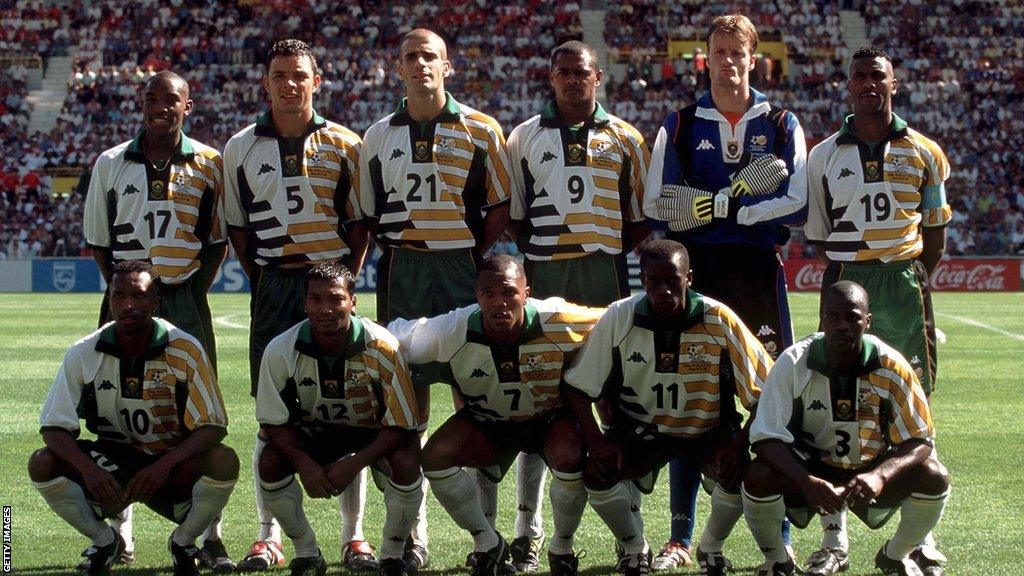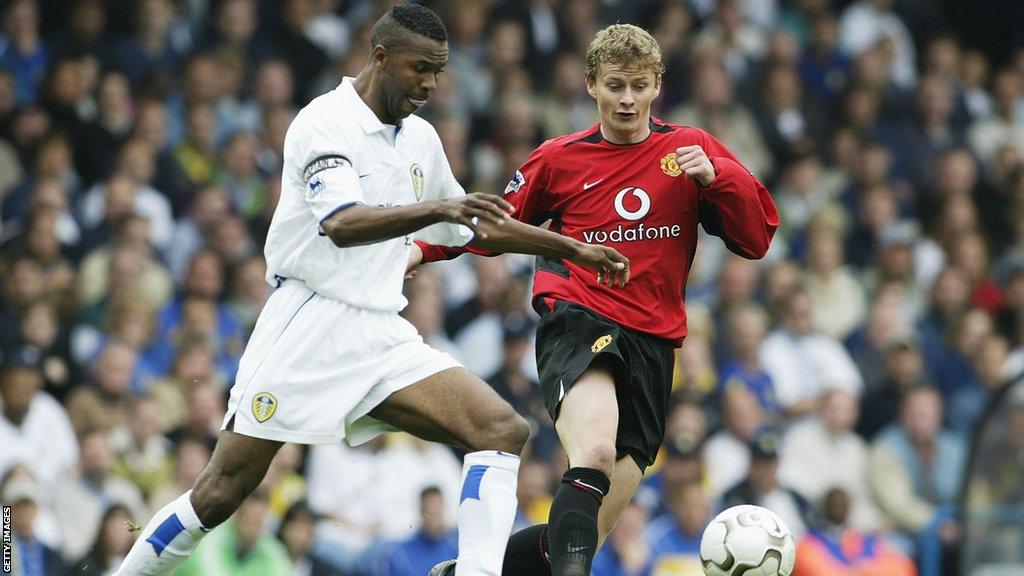Lucas Radebe calls for the reform of the 'politics involved' in South African football
- Published

Lucas Radebe (top right) believes more former players must be included if South Africa are to turn around their footballing fortunes
Former national team captain Lucas Radebe has called for reform of the "politics involved" in South African football.
The former Leeds United centre back, 54, made his international debut against Cameroon in 1992 in the country's first post-apartheid match.
Radebe also led the side at the 1998 and 2002 World Cups but believes the exclusion of former players is adding to the decline in the country's fortunes since hosting the global event in 2010.
"Most of us who have played the game are not involved in the structures of the game," Radebe told the BBC's Africa Daily podcast.
"Obviously, with the politics that is involved in the game, it becomes very stressful for individuals like us to get involved in the game and make sure that the game continues to improve in the country and we sustain that.
"We can't have a great team in 1996 and have a great - a better team - in 2010, but then after that, with all the facilities that we have, it becomes a big problem."
Back to basics
Radebe spent 11 seasons in the Premier League with Leeds d and appeared 70 times for Bafana Bafana - the nickname of the national side which translates from Swati to: "the boys, the boys".
In 1996, Radebe helped his country to the Africa Cup of Nations, hosted in South Africa, but that remains their only continental title.
"We have to restructure to see the great Bafana Bafana coming back. We've got the talent, you can see but we can't sustain it," added Radebe.
"We're not consistent enough to be able to say that we can compete now and get to that level.
"We see players that are on form playing for Bafana Bafana - well, if they're on form, they're not being chosen, which doesn't bring stability to the national team.
"So for me, if you have to improve you need to get relevant people in football to get involved. Sit down around the table. Let's go back to basics."

Radebe in action for Leeds against Manchester United's Ole Gunnar Solskjaer
South Africa had been one of the four original teams that formed the first Africa Cup of Nations but were disqualified due to apartheid.
Following their 1996 victory they were losing finalists to Egypt in 1998 and won the third placed play-off, beating Tunisia on penalties, in 2000.
Radebe believes the subsequent years have been a dramatic underperformance - including when hosting the event against in 2013 - from a side that should be a major team on the continent.
"There's no proper development, where you can get the local players getting involved in football and locally because there's no scouts," Radebe continued.
"Everyone now, since football has become big business, are looking to buy from outside the country. They need to buy players and import them.
"Well for me becomes a big problem because we don't get the talent that we need. And we don't develop it properly.
"It doesn't only start at club level, but it starts with agents. Most of them they're looking at quick success.
"They're looking for readymade players so there is no time or they don't give time for players to develop and obviously local football suffers."
Better organisation needed
Radebe points directly to Uganda goalkeeper Denis Onyango, who plays for Mamelodi Sundowns, as a prime example of the type of player that South Africa needs to attract.
"As long as we have the quality, I don't have a problem with that," Radebe said. "But we can't have players that are not going to improve our game.
"Denis Onyango is a quality player but the problem is when we have more players that don't belong to the country.
"The players that play here in South Africa playing for their countries like Malawi, Zimbabwe and playing against us - those teams are better organised than us.
"It's easy for us to point fingers. Yes, it's true that we should empower ourselves but, again, we need the help of our association.
"They should have actually structured somehow a legends forum or a legends facility where we can come back and then we can be part of the national team going forward in the structures, empowering us for future succession plans."

A thrilling Scandi-noir with a killer twist...: Watch Lost: Those Who Kill on BBC iPlayer now
How many footballing milestones do you know? Test yourself in this fun quiz
